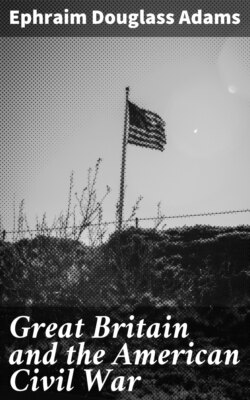Great Britain and the American Civil War

Реклама. ООО «ЛитРес», ИНН: 7719571260.
Оглавление
Ephraim Douglass Adams. Great Britain and the American Civil War
Great Britain and the American Civil War
Table of Contents
PREFACE
CONTENTS. OF. VOLUME ONE
PART ONE
GREAT BRITAIN. AND THE. AMERICAN CIVIL WAR
CHAPTER I
BACKGROUNDS
CHAPTER II
FIRST KNOWLEDGE OF IMPENDING CONFLICT, 1860–61
CHAPTER III
THE DEVELOPMENT OF A POLICY, MAY, 1861
CHAPTER IV
BRITISH SUSPICION OF SEWARD
CHAPTER V
THE DECLARATION OF PARIS NEGOTIATION
CHAPTER VI
BULL RUN; CONSUL BUNCH; COTTON AND MERCIER
CHAPTER VII
THE "TRENT"
CHAPTER VIII
THE BLOCKADE
CHAPTER IX
ENTER MR. LINDSAY
CONTENTS. OF. VOLUME TWO
LIST OF ILLUSTRATIONS
PART TWO
GREAT BRITAIN. AND THE. AMERICAN CIVIL WAR
CHAPTER X
KING COTTON
CHAPTER XI
RUSSELL'S MEDIATION PLAN
CHAPTER XII
THE EMANCIPATION PROCLAMATION
CHAPTER XIII
THE LAIRD RAMS
CHAPTER XIV
ROEBUCK'S MOTION
CHAPTER XV
THE SOUTHERN INDEPENDENCE ASSOCIATION
CHAPTER XVI
BRITISH CONFIDENCE IN THE SOUTH
CHAPTER XVII
THE END OF THE WAR
CHAPTER XVIII
THE KEY-NOTE OF BRITISH ATTITUDE
INDEX
Отрывок из книги
Ephraim Douglass Adams
Published by Good Press, 2019
.....
Buckingham, one-time member of Parliament, wrote nine volumes of such description. His work is a storehouse of fact, useful to this day to the American historical student[18]. George Combe, philosopher and phrenologist, studied especially social institutions[19]. Joseph Sturge, philanthropist and abolitionist, made a tour, under the guidance of the poet Whittier, through the Northern and Eastern States[20]. Featherstonaugh, a scientist and civil engineer, described the Southern slave states, in terms completely at variance with those of Sturge[21]. Kennedy, traveller in Texas, and later British consul at Galveston, and Warburton, a traveller who came to the United States by way of Canada, an unusual approach, were both frankly startled, the latter professedly alarmed, at the evidences of power in America[22]. Amazed at the energy, growth and prosperity of the country and alarmed at the anti-British feeling he found in New York City, Warburton wrote that "they [Americans] only wait for matured power to apply the incendiary torch of Republicanism to the nations of Europe[23]." Soon after this was written there began, in 1848, that great tide of Irish emigration to America which heavily reinforced the anti-British attitude of the City of New York, and largely changed its character.
Upon receipt of the news from South Carolina, the Times, in a long and carefully worded editorial, took up one by one the alleged causes of secession, dismissed them as inadequate, and concluded, " … we cannot disguise from ourselves that, apart from all political complications, there is a right and a wrong in this question, and that the right belongs, with all its advantages, to the States of the North[52]." Three days later it asserted, "The North is for freedom of discussion, the South represses freedom of discussion with the tar-brush and the pine-fagot." And again, on January 10, "The Southern States expected sympathy for their undertaking from the public opinion of this country. The tone of the press has already done much to undeceive them. … "
.....